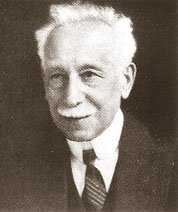Sylvain Lévi
| Sylvain Lévi | |
|---|---|
 | |
| Born |
March 28, 1863 Paris, France |
| Died |
October 30, 1935 (aged 72) Paris, France |
| Fields | Sanskrit language, literature, Buddhism |
| Institutions | Collège de France |
| Notable students | Paul Demiéville, Paul Pelliot |
Sylvain Lévi (March 28, 1863 – October 30, 1935) was an orientalist and indologist.[1] Born in Paris on March 28, 1863, his book Théâtre Indien is an important work on the subject. Lévi also conducted some of the earliest analysis of Tokharian fragments discovered in Western China.
He was also an early opponent of the traditionalist author René Guénon, citing the latter's uncritical belief in a "Perennial philosophy", that is, a primal truth revealed directly to primitive humanity, based on an extreme reductionist view of Hinduism, which was the subject of Guénon's first book, L'Introduction générale a l'étude des doctrines hindoues, in fact a thesis delivered to Lévi at the Sorbonne, and rejected.
Works
- Le Théâtre Indien, Deuxième tirage, 1963, Publié à l'occasion du centenaire de la naissance de Sylvain Lévi, Bibliothèque de l'Ecole des Hautes Etudes, IVe section, 83e Fascicule, Paris, Distributeur exclusif: Librairie Honoré Champion.
- Lévi, S. 1898. La doctrine du sacrifice dans les Brâhmanas, Paris : Ernest Leroux, Bibliothèque de l’École des Hautes Études-Sciences religieuses [= BÉHÉ-SR], vol. 11.
- Lévi, S. 1966. Id., avec une préface de L. Renou, 2e éd., Paris : Presses Universitaires de France, BÉHÉ-SR, vol. 73.
- Lévi, S. 2003. Id., réimpr. de Lévi 1966, avec une postface inédite de Ch. Malamoud, Brepols : Turnhout, BÉHÉ-SR, vol. 118.
- Le Népal: Étude historique d’un royaume hindou, Sylvain Lévi, 3 vol. 1905–08, Paris
- Nepal: Historical study of a Hindu kingdom, Sylvain Levi, Ancient Nepal, 44 installments, 1973–90.
- Asvaghosa, le sutralamkara et ses sources, S. Lévi, JA, 1908, 12, p. 57-193
- Autour d'Asvaghosa, Sylvain Lévi, JA, Oc-Déc. 1929, p. 281-283
- Kanishka et Satavahana, Sylvain Lévi, JA, Jan–Mars 1936, p. 103-107
- Le Bouddhisme et les Grecs, S. Lévi, R.H.R. 23 (1891), p. 37
- L'énigme des 256 nuits d'Asoka, Sylvain Lévi, JA 1948, p. 143-153
- Les études orientales, par Sylvain Lévi, Annales du musée Guimet numéro 36, Hachette 1911, ANU DS1.P32.t36
- Les grands hommes dans l'histoire de l'Inde, par Sylvain Lévi, Annales du musée Guimet numéro 40, Hachette 1913, ANU A DS1.P32.t40
- Les seize Arhats protecteurs de la loi, Sylvain Lévi et Édouard Chavannes, JA 1916, vol. II, p. 204-275
- Le sutra du sage et du fou, Sylvain Lévi, JA, Oc-Déc. 1925, p. 320-326, ANU pBL1411.A82.L4
- L'inde civilisatrice, aperçu historique, S. Lévi, Paris 1938
- L'Inde et le Monde, par Sylvain Lévi, Honoré Champion 1926, ANU G B131.L4
- Madhyantavibhangatika, tr. S. Lévi ?, ANU BQ2965.Y3
- Mahayanasutralamkara, exposé de la doctrine du Grand Véhicule selon le système Yogachara, tr. française Sylvain Lévi, Librairie Honoré Champion, 5 Quai Malaquais, Paris 1911, réimpression Rinsen Book Co. Kyoto 1983 (ISBN 4-653-00951-1) ANU BQ3002.L48.1983.t2
- Maitreya, le consolateur, S. Lévi, Mélanges Linossier, II, pp. 362–3 & pp. 355–402
- Matériaux pour l'étude du système Vijnaptimatra, Sylvain Lévi, Paris Chanmpion 1932
- Nairatmyapariprccha, Sylvain Lévi, JA, Oct-Déc. 1928, p. 209-215
- Notes indiennes, Sylvain Lévi, JA, Janv. Mars 1925, p. 26-35
- Notes sur les manuscrits sanscrits provenant de Bamiyan et de Gilgit, S. Lévi
- Observations sur une langue précanonique du bouddhisme, S. Lévi, JA Nov-Déc. 1912, p. 511
- Sur la récitation primitive des textes bouddhiques, Sylvain Lévi, JA, Mai-Juin 1915, p. 401-407
- Une langue précanonique du bouddhisme, S. Lévi, JA 1912, p. 495-514
- Vijnaptimatratasiddhi, Sylvain Lévi, Paris 1925, ANU AA BL1405.B8
- Vimsika-Vimsatika de Vasubandhu, tr. S. Lévi, Bibliothèque de l'École des Hautes Etudes fascicule 245-1925 et 260-1932 Paris
- JA = Journal Asiatique
References
- ↑ "Sylvain Levi (French orientalist)". Encyclopedia Britannica. Retrieved 13 July 2014.
| Wikimedia Commons has media related to Sylvain Lévi. |
|